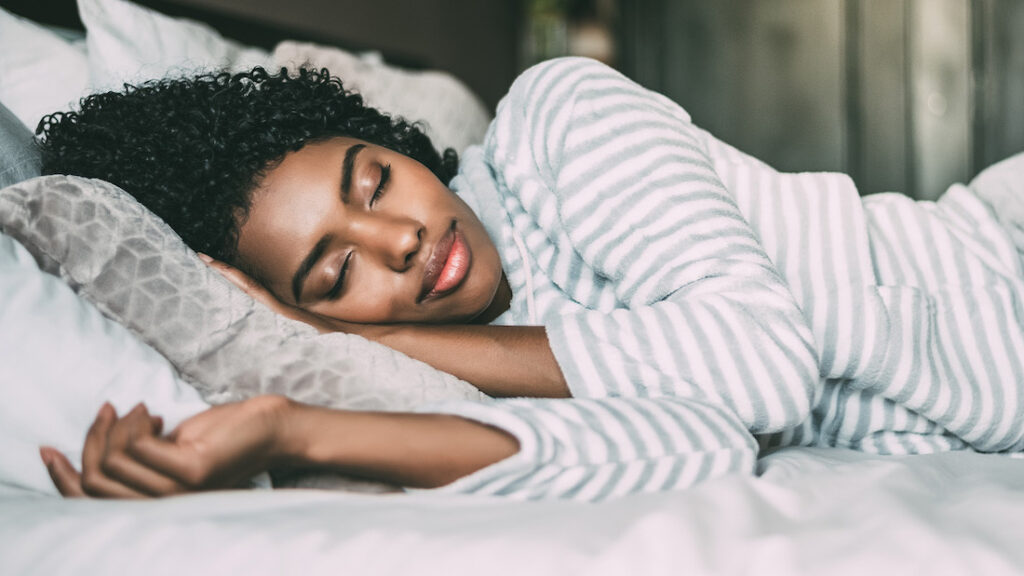
If you imagine yourself in fake or fantastical scenarios before bed, such as falling in love with your celebrity crush or having a romantic Valentine’s dinner with your significant other, you’re not alone.
Users of Twitter and TikTok are embracing the idea of creating drama-filled fake scenarios to spice up a dull bedtime routine. In reality, no one likes to fall asleep thinking about work and the stress that fills our day.
Hear Sleepopolis’ director of sleep health, Dr. Shelby Harris, chat all things sleep on our podcast Sleep Talking With Dr. Shelby!
Getting ready to fall asleep is the time to turn our dreams into a soap opera, which people across social media are currently enjoying doing to fall asleep at night and take a break from the reality of their lives.
From tweets that said, “Fake scenarios before bed are so therapeutic,” to “Do you make up fake scenarios to dream about before bed or are you normal?” caused us to want to look further into the phenomenon.
Along with Twitter, TikTok users are even suggesting fake scenarios to think about before bed to POV’s of people deciding which fake scenario to pick to fall asleep on a particular night.
Overall, it seems that fake scenarios are a fan favorite and an effective trick for people to use to fall asleep. However, a top-liked TikTok from the user @lowmariam claimed in a viral TikTok that gathered 8.2 million views that creating these scenarios might be a sign of mental illness.
Wait, what?! We thought these fake scenarios were all just fun and games, but after seeing this we had even more questions. We wanted to delve deeper into this and explore whether there is a correlation between the practice of imagining fictitious scenarios before sleep and signs of mental health issues. After speaking with an expert, we now know if those fake scenarios before bed could be doing more harm than good.
So, What’s The Deep Truth of Why We Do This?
Hold on! Delay removing this element from your bedtime routine, as there’s no need to give up something enjoyable, especially if it aids in your ability to fall asleep at night.
We spoke with Brandy Smith, who is a licensed psychologist with Thriveworks in Birmingham, Alabama. She said individuals often conjure fictional scenarios in their minds before peacefully falling asleep. This practice helps us feel more prepared for potential future events, providing a sense of grounding and security.
However, she said there is a difference between preparing for a scenario and distressing over one, which is something to look for when creating fake scenarios before going to bed.
“Sometimes when people worry or have anxiety about something, creating scenarios of what may happen as well as planning and working to brainstorm ideas may help them feel more secure in different situations,” she told Sleepopolis. “There are times when creating “fake scenarios” may be beneficial based on how a person operates, but even for those individuals there is a line to keep in mind of when it is helping versus exacerbating distress and/or anxiety.”
Smith also said bedtime rumination, which is repetitive thinking before bedtime, can easily cause anxiety and racing thoughts before bedtime. She said one tactic to examine if these thoughts before bed are harmful or helpful is by using a 1-10 scale to evaluate how helpful the thinking one is experiencing is.
“One way to gauge if it is helpful or not is to ask a scaling question such as a 1-10 scale — how helpful or grounding does this thinking seem to be for me 1-very unhelpful, 10- very helpful),” she said. “While that is a self-report ‘measure,’ it still gives a reference point. Another option would be to check heart rate before, during, and after. If the heart rate remains high at the end of the activity, have intentional activities that can slow it down to de-escalate one’s system.”
If you think your fake scenarios before bedtime might be a sign of mental illness, Smith said to consider talking with others, reading books, reading online articles and watching videos from trusted sources to see how other people found solutions to similar situations. If these resources don’t seem to be helpful, it might also be time to consult with a medical provider to get down to the root of the problem.
“It could be a short consultation with a provider, may be a few sessions together or it may end up being longer term, but that decision could be tailored to the person seeking assistance,” she said. “We have to destigmatize help-seeking because it is a wise and courageous step to take yet continues to be seen by many in a negative light.”
Creating fake scenarios before bed can be fun and take us away from the true realities of life for a moment. However, it is important to recognize if these scenarios are contributing to a larger problem.




























